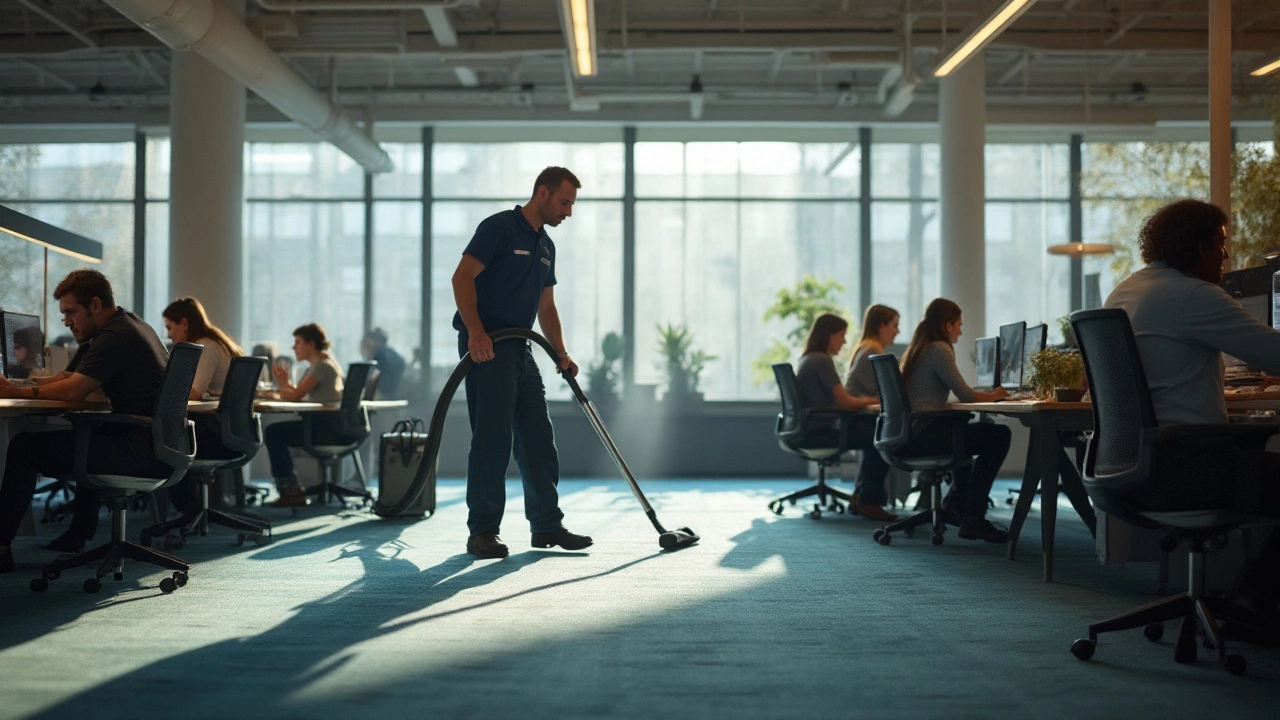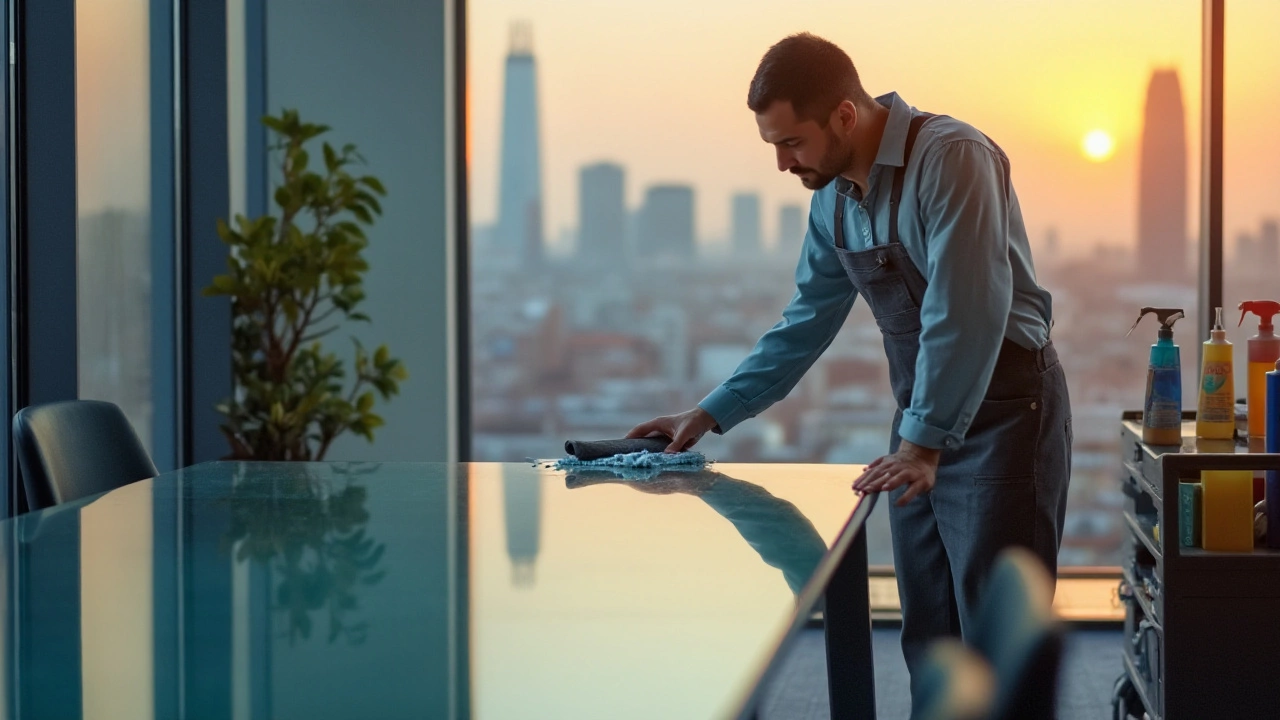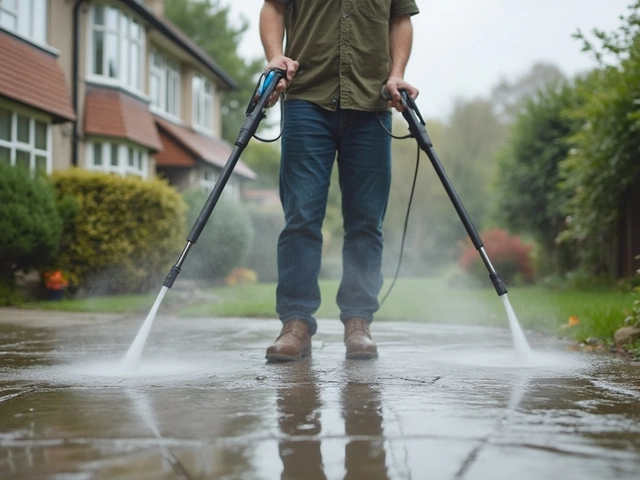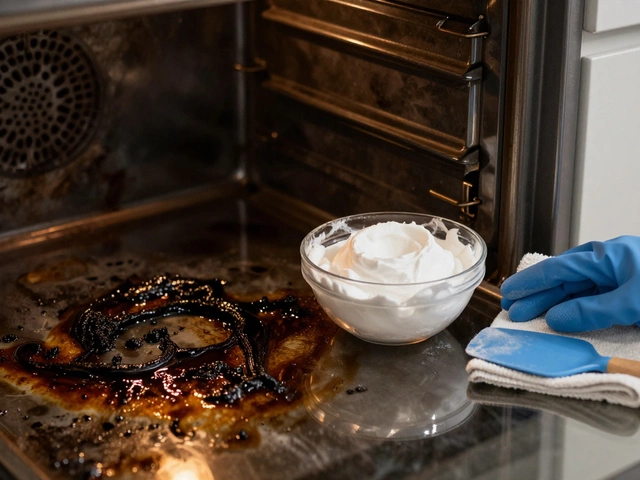An office cleaner's role might seem straightforward at first glance, but there's much more beneath the surface. These individuals are the unsung heroes keeping workspaces pristine and ensuring a welcoming environment for all employees. In a world where hygiene has never been more important, the skill set of a top-tier office cleaner has expanded beyond traditional cleaning tasks.
Great office cleaners are meticulous in their work, noticing the small bits of dust that others overlook. They're the backbone of workplace hygiene, ensuring that every nook and cranny receives the attention it deserves. But there's more than just their skill with a mop and dustcloth. The best among them always bring reliability to the table, and their punctuality can be a subtle yet impactful way to respect the office's routine. Armed with an understanding of various cleaning agents, they know just how to deal with different surfaces and materials to avoid damage while keeping everything spotless.
It's not all about physical labor, though. Good cleaners are communicative, effectively liaising with office staff to fulfill any special requests and addressing any concerns that may arise. They remain flexible, adapting to new cleaning challenges as they come, anticipating needs before they become issues. Their proactive nature ensures the office environment remains clean, healthy, and inviting, day after day.
- Attention to Detail
- Reliability and Punctuality
- Knowledge of Cleaning Products and Techniques
- Effective Communication Skills
- Adaptability and Proactivity
Attention to Detail
When it comes to the world of office cleaning, attention to detail is what separates a good cleaner from a truly exceptional one. This skill involves more than just a keen eye; it is a mindset that dwells on precision and thoroughness. An excellent office cleaner notices areas that are often missed, like the accumulation of dust behind computer monitors, fingerprints on glass partitions, and smudges around door handles. They understand that these small details collectively contribute to the first impression an office creates, affecting both employee morale and visitor perceptions.
Consider a scenario involving a high-stakes presentation in the office conference room. The difference between a room that is just serviceably clean and one that is sparkling clean is monumental. It begins with the vacuum lines on a carpet, the absence of any stray paperclips under the desk, and even the finesse involved in arranging magazines in the waiting area. That level of excellence results from a meticulous office cleaner who carries an agenda parallel to the office’s overarching goals — to create an environment that fosters productivity and calm. According to the British Cleaning Council, the cleanliness of an office is closely linked to improved employee well-being and can boost productivity by up to 10%.
Alongside physical cleanliness, mental diligence plays a pivotal role. Office cleaners boasting meticulous attention frequently engage in self-assessment and self-improvement, continuously asking themselves if there's an aspect of their cleaning routine that can be refined. Such introspection fuels their motivation to excel in maintaining workplace hygiene. They understand that cleaning is more about transformation rather than mere upkeep. Just like an artist sees a blank canvas, they view the office space as theirs to craft into a masterpiece of cleanliness. This mentality propels not just their daily tasks but the respect they command from office staff who see them as an integral component of the team.
Statistics further showcase the importance of a cleaner’s detailed focus. A survey by ISSA, a global cleaning industry association, noted that tidy and well-organized work spaces are 5 times less likely to cause distractions among employees, ultimately leading to higher focus and productivity. To maintain such high standards, an office cleaner often adheres to systems and checklists to ensure nothing is overlooked. Lists can help ensure consistency across different offices, and checking these regularly helps in maintaining routines. Unrelenting attention to detail sets successful office cleaners apart, enabling them to deliver an impeccably clean environment conducive to everyone’s success.
Reliability and Punctuality
In the context of office cleaning, reliability and punctuality are not just desirable qualities; they are a testament to the professionalism of the cleaner. When we talk about reliability, we're discussing an unwavering commitment to consistent performance and meeting the expectations of the office staff. Imagine arriving at work to find the conference room impeccably clean before a big meeting—thanks to a cleaner who values consistency. This level of dependability builds trust and peace of mind for everyone in the workspace.
Being punctual is another critical facet, especially in environments where timing is crucial and every minute counts. A cleaner who shows up on time, every time, helps maintain the rhythm of the workplace without disruption. This timeliness demonstrates respect not just for the cleaning schedule but for the entire office ecosystem. Consistent punctuality ensures that cleaning tasks are completed at optimal times, such as before or after regular working hours, minimizing impact on daily operations and preserving the workflow.
"Time is the most valuable thing a man can spend," said Theophrastus, an ancient philosopher, highlighting how the perception of time utilization has remained pivotal through the epochs.
Moreover, being reliable and punctual often reflects the cleaner's deeper understanding of their role within the company. They recognize that their work supports a broader mission—enhancing employee productivity and ensuring a healthy working environment. This isn't just about showing up; it's about showing up with intent and readiness, equipped to tackle the day's tasks efficiently. The ability to keep consistent attendance records also adds another layer of credibility, portraying an individual who takes their responsibilities seriously and values their role within the organization.
For managers, keeping track of cleaner qualities like reliability and punctuality is essential when assessing the impact of cleaning staff on the larger office operation. A reliable cleaner can often be the unseen yet crucial support system that keeps the office environment conducive for productivity. When decision-makers value and acknowledge these traits, it often leads to better morale and increased motivation among cleaning teams. After all, recognition serves as a powerful motivator, prompting employees to maintain their high standards.
Finally, the interplay between reliability and punctuality can indeed affect an office cleaner's career progression. Many organizations offer incentives and career advancement opportunities to those who demonstrate these qualities consistently. For example, a cleaner who is known for their dependability may be entrusted with more critical tasks or advance to supervisory roles. This becomes a mutually beneficial scenario—organizations gain from a dependable resource, while the cleaner achieves professional growth.

Knowledge of Cleaning Products and Techniques
When it comes to being an exceptional office cleaner, an in-depth understanding of cleaning products and their appropriate usage is paramount. This knowledge ensures that every surface is not only clean but also preserved, extending the life span of office furnishings and fixtures. The modern office is filled with diverse materials—from polished wood to delicate electronics—and each requires a different approach. For instance, wooden desks often demand gentle, alcohol-free cleaners to maintain their finish, while stainless steel surfaces might need products specifically formulated for metal to avoid unsightly streaks.
Equally important are the techniques employed. A skilled cleaner knows that effective cleaning isn't just about scrubbing harder but about using the right method. This means knowing when to use circular motions for glass or when straight strokes are better for keeping mirrors streak-free. Mastery over techniques influences not only the quality of cleaning but also the time efficiency, allowing cleaners to work swiftly without sacrificing standards. Knowledge of eco-friendly, non-toxic products has gained importance too, as businesses strive to provide safe environments for their staff. Many companies have begun adopting green cleaning practices, which in turn necessitates cleaners to be well-versed in these options.
There's also a significant aspect of safety to consider. Knowing how to handle various cleaning products safely, understanding their potential interactions, and what protective gear to use when dealing with harsh chemicals is critical. This prevents accidents and promotes a safe working environment not just for the cleaner, but for all those who pass through the office space. Often, respected experts in the field of hygiene emphasize the importance of continuous education for cleaners to stay abreast of the latest products and techniques.
"The difference between a good cleaner and a great one often lies in their willingness to learn and adapt," says Marian Hunter, a pioneer in eco-friendly cleaning practices.
Many resourceful cleaners keep a log or inventory of cleaning supplies to track what they use most frequently and identify patterns in their cleaning routine. This habit can further inform decisions on which products to stock up on, potentially reducing costs in the long run. They are adept at reading labels, which might include deciphering complex ingredient lists to ensure safety and effectiveness.
Office cleaners also benefit from a basic understanding of engineering controls. For example, knowing how to use different types of vacuum cleaners—whether it's an upright model for carpets or a canister vacuum for hard-to-reach spaces—can significantly enhance the cleaning outcome. This isn't simply a matter of wielding equipment but involves recognizing the right machine for the job, selecting appropriate attachments, and maintaining equipment to ensure optimal performance.
To provide a holistic view, let’s look at some pertinent data. A small survey found that workplaces which utilized routine non-toxic cleaning products reported a 23% reduction in sick leaves compared to those using conventional, harsher chemicals. Such insights encourage cleaners to advocate for greener practices and demonstrate the tangible benefits of their expertise not only in maintaining cleanliness but also in promoting health and wellness.
Effective Communication Skills
In the world of office cleaning, communication skills are not often the first trait people associate with the role, yet they are incredibly vital. Imagine stepping into an office where cleaners work silently and invisibly, yet their presence is palpable due to the spotless nature of their labor. For cleaners to ensure nothing is amiss, they must possess strong lines of communication with the office staff and management. This means not only hearing the requests and concerns being voiced but also proactively seeking feedback on their work. It requires an understanding of the office dynamic, recognizing the role they play, and acknowledging the impact of their efforts on productivity and morale.
Good communicators build relationships within the workplace. These relationships are built on trust and mutual respect, and they often go unnoticed, created through quick exchanges and courteous conversations. By talking to employees and supervisors, office cleaners can determine what areas may need more frequent attention and any special instructions. For instance, if a meeting room is particularly busy due to a week-long conference, cleaners might need to adjust their schedule or prioritize certain areas more than usual. Therefore, it’s beneficial when cleaners maintain open dialogues with office personnel to anticipate such changes.
Clear communication also extends to understanding and delivering specific instructions about using cleaning products. Office cleaners educate themselves about different products they use, not just for the sake of efficiency but for safety as well. They often need to explain to non-cleaning staff why certain products are chosen or how specific cleaning methods benefit the office. This knowledge sharing reassures employees about workplace hygiene, especially when chemicals and equipment are involved. "Office environments thrive on cleanliness, which in turn relies heavily on proactive communication," says Dr. Caroline Jenkins, an expert in workplace hygiene and organizational behavior. Maintaining a healthy office is a collective effort, and communication is the glue that binds this process.
Moreover, conflict resolution sometimes plays a surprising role in a cleaner’s day. For instance, they might encounter disagreements about the frequency of their visits or the time slots allocated for cleaning. In such situations, effective communication helps to navigate these challenges without friction. By approaching these challenges diplomatically, cleaners become adept at not only resolving but also preemptively identifying potential sources of tension. This skill is invaluable when managing the expectations of multiple departments or individuals who may have conflicting needs and priorities.
Finally, technology plays an increasingly prominent role in mediating communication. Many office cleaners now use apps and digital scheduling tools to manage their cleaning routines. These tools often offer channels for feedback where office workers can leave notes or requests directly. This integration ensures nothing is lost in translation and that communication remains clear, immediate, and documented.

Adaptability and Proactivity
The modern workplace is a dynamic environment, often changing with little notice. A remarkable office cleaner provides a crucial service by adapting swiftly to the ever-evolving needs of the office space. Adaptability in cleaning involves a willingness to embrace new tasks or procedures that may arise unexpectedly. For instance, with the rise in remote work and flexible office hours, some areas might require more attention than others at different times, so a cleaner must efficiently alter their routine to accommodate these shifts. They may have to adjust to different cleaning schedules or embrace new technologies designed to streamline their efforts without disrupting productivity.
Besides adaptability, proactivity sets exceptional cleaners apart. They don't merely wait for tasks to be assigned but instead take initiative to identify potential sanitary issues and rectify them before they become problems. Whether it's ensuring supplies are restocked regularly or noticing that a carpet needs a more thorough clean, proactive cleaners understand that maintaining a consistently clean office requires vigilance and a forward-thinking mindset. Such proactive approach helps in creating an environment where employees feel valued, knowing that the cleanliness of their shared space is taken seriously. A story shared in the journal ‘Professional Cleaning’ highlights this:
"In the cleaning industry, those who anticipate problems instead of reacting to them can drastically reduce downtime and improve workplace satisfaction," says Joanne Timbers, an expert in workplace sanitation.
Being both adaptable and proactive often requires a substantial knowledge base of cleaning techniques and a readiness to continuously learn. To cultivate these skills, a cleaner might engage with various professional resources or partake in workshops aimed at elevating cleaning standards. This ongoing education is essential as the cleaning industry is not static; new environmentally friendly products or advanced machines, designed to enhance efficiency without sacrificing quality, are constantly being introduced. In a recent survey, 68% of cleaning professionals reported that using new cleaning technologies improved their performance while also reducing time spent on routine tasks, emphasizing the value of innovation in maintaining a clean workplace.
A proactive cleaner is invaluable to an office environment. They can detect early signs of wear and tear, such as identifying mould in moist areas or understanding when upholstery requires special attention. Implementing a detailed checklist has proven beneficial in anticipating these issues early. Such a checklist might include a list of areas prone to heavy traffic, like conference rooms and lobbies, and specific tasks coupled with optimal timings for execution. By doing so, cleaners can maintain an optimal hygiene environment, and office staff can focus on their core tasks without distractions or delays caused by sanitation issues.





